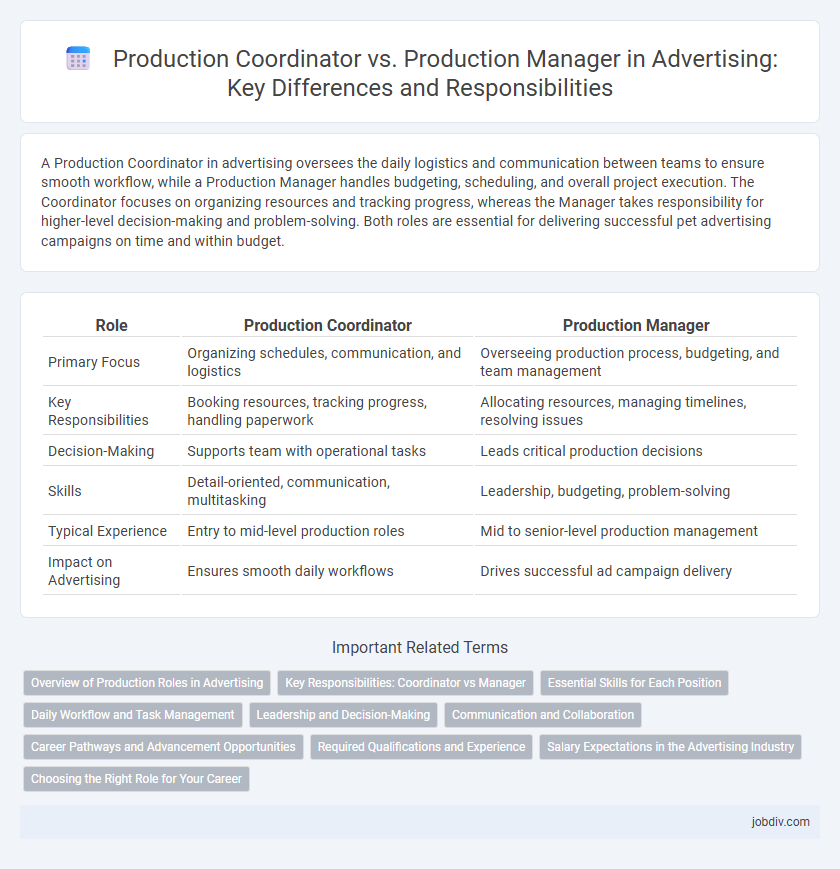A Production Coordinator in advertising oversees the daily logistics and communication between teams to ensure smooth workflow, while a Production Manager handles budgeting, scheduling, and overall project execution. The Coordinator focuses on organizing resources and tracking progress, whereas the Manager takes responsibility for higher-level decision-making and problem-solving. Both roles are essential for delivering successful pet advertising campaigns on time and within budget.
Table of Comparison
| Role | Production Coordinator | Production Manager |
|---|---|---|
| Primary Focus | Organizing schedules, communication, and logistics | Overseeing production process, budgeting, and team management |
| Key Responsibilities | Booking resources, tracking progress, handling paperwork | Allocating resources, managing timelines, resolving issues |
| Decision-Making | Supports team with operational tasks | Leads critical production decisions |
| Skills | Detail-oriented, communication, multitasking | Leadership, budgeting, problem-solving |
| Typical Experience | Entry to mid-level production roles | Mid to senior-level production management |
| Impact on Advertising | Ensures smooth daily workflows | Drives successful ad campaign delivery |
Overview of Production Roles in Advertising
Production Coordinators in advertising organize schedules, manage communication between teams, and ensure logistical details are executed efficiently. Production Managers oversee the entire production process, managing budgets, timelines, and resources to deliver projects on target. Both roles are essential for seamless workflow and successful campaign execution in advertising production.
Key Responsibilities: Coordinator vs Manager
A Production Coordinator handles logistical details such as scheduling, communication between departments, and resource allocation to ensure smooth daily operations during advertising campaigns. In contrast, a Production Manager oversees the overall production process, managing budgets, timelines, and team performance to deliver projects on time and within scope. The Production Manager also resolves high-level challenges and makes strategic decisions that impact the campaign's success and quality.
Essential Skills for Each Position
Production Coordinators excel in organizational skills, attention to detail, and effective communication to manage schedules, coordinate resources, and support team collaboration in advertising projects. Production Managers demonstrate strong leadership, budgeting expertise, and problem-solving abilities to oversee entire production processes, ensure timelines are met, and maintain quality standards. Both roles require proficiency in project management software and adaptability to fast-paced environments, but differing levels of responsibility distinguish their essential skills.
Daily Workflow and Task Management
Production Coordinators in advertising primarily handle daily scheduling, resource allocation, and communication between creative teams, ensuring smooth task execution. Production Managers oversee the entire production process, managing budgets, timelines, and quality control to meet client expectations. Effective task management hinges on Coordinators maintaining real-time updates while Managers align overall workflow with strategic project goals.
Leadership and Decision-Making
Production Coordinators in advertising primarily support project logistics and communication, ensuring smooth workflow and timely task completion, while Production Managers take on a leadership role by overseeing the entire production process and making strategic decisions that impact budget, schedules, and resource allocation. Effective Leadership in Production Management involves not only supervising teams but also resolving conflicts, motivating staff, and steering projects toward client goals. Strong Decision-Making skills distinguish Production Managers by enabling them to assess risks, prioritize tasks, and implement solutions under tight deadlines to maintain campaign quality and efficiency.
Communication and Collaboration
Production Coordinators in advertising streamline communication by managing schedules, coordinating between creative teams, clients, and vendors to ensure timely information flow. Production Managers oversee broader collaboration efforts, aligning multiple departments and resources to meet project deadlines and budgets efficiently. Both roles require strong interpersonal skills, but Production Managers typically lead strategic communication while Coordinators handle day-to-day operational exchanges.
Career Pathways and Advancement Opportunities
Production Coordinators in advertising primarily handle logistical tasks and support roles, gaining hands-on experience with project timelines and resource allocation. Production Managers oversee broader project execution, managing budgets, teams, and client communications, which positions them for senior roles such as Executive Producer or Operations Director. Career advancement typically involves progressing from Coordination to Management, leveraging leadership skills and industry knowledge to move into strategic and high-responsibility positions.
Required Qualifications and Experience
Production Coordinators in advertising typically require strong organizational skills, proficiency in project management software, and 1-3 years of experience supporting production teams. Production Managers demand extensive industry knowledge, leadership abilities, and 5-7 years of experience overseeing end-to-end advertising campaigns to ensure timely delivery and budget compliance. Both roles prioritize excellent communication skills and the ability to coordinate cross-functional teams effectively.
Salary Expectations in the Advertising Industry
Production Coordinators in the advertising industry typically earn between $40,000 and $55,000 annually, reflecting their role in supporting project logistics and communication. Production Managers command higher salaries, ranging from $65,000 to $90,000, due to their responsibility for overseeing entire production processes and managing teams. Salary variations depend on factors such as geographic location, company size, and individual experience levels within the advertising sector.
Choosing the Right Role for Your Career
Production Coordinators handle the logistical details of advertising campaigns, ensuring seamless communication among creative teams, vendors, and clients. Production Managers oversee the entire production process, managing budgets, schedules, and resource allocation to meet project deadlines. Choosing between these roles depends on your preference for detailed coordination versus strategic oversight in the advertising industry.
Production Coordinator vs Production Manager Infographic

 jobdiv.com
jobdiv.com